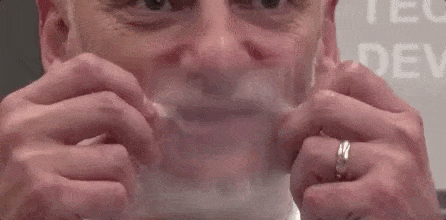These Transparent Face Masks Might Make You Feel Normal Again

The Swiss Federal Institute of Technology Lausanne (EPFL) and the Swiss Federal Laboratories for Materials Science and Technology (Empa) have devised a transparent surgical face mask that will "soon be produced on an industrial scale."
To fabricate them, researchers had to come up with an all-new polymer material.
They say the ability to see facial expressions will lead to more empathic health care providers.
In addition to being required in most public settings amid the COVID-19 (coronavirus) pandemic, face masks have also become a fashion statement, protest symbol, and possible mainstay in our western culture. But they're not very helpful in expressing nonverbal cues and emotions.
That's why for the last two years, the Swiss Federal Institute of Technology Lausanne (EPFL) and the Swiss Federal Laboratories for Materials Science and Technology (Empa) have been developing a novel, transparent material that can filter air through small pores to prevent the spread of harmful bacteria and viruses, while also making it easier for patients to read a nurse or doctor's facial expressions.
Known as HelloMasks, the new face coverings are meant to replace the blue, white, or green tri-fold masks that nurses and doctors wear. Klaus Schönenberger, the head of EPFL’s EssentialTech Center—which aids in technology transfers to bring innovative medical supplies to developing countries—first came up with the idea after working in western African countries throughout the 2015 Ebola outbreak.
"It was touching to see that nurses—covered from head to toe in protective gear—pinned photos of themselves on their chests so that patients could see their faces," he said in a prepared statement. But it just wasn't the same, and the photos didn't help hearing-impaired patients, who rely on lipreading.
Schönenberger knew these limitations, but at the time, there wasn't any transparent material that could also be porous for breathing. So EPFL and Empa researchers designed a polymer membrane for the surgical masks.
Because the polymer fibers are just 100 nanometers apart (about 1/1,000th the width of a human hair), the pores are approximately the same size as those used in conventional surgical masks, meaning air can pass through freely, while viruses and bacteria are too large to break through.

To make the polymer material, researchers turned to a common fiber production method called electrospinning, which uses an electric force to draw charged polymer threads. For large-scale production, the scientists adapted the method slightly so they can generate the polymer in spools. Then, workers will fabricate the masks in Switzerland.
And because the scientists are aware of the face mask littering that has arisen due to the general public wearing protective face coverings, they ensured the polymer material was made up of 99 percent biomass-derivative materials, meaning they're mostly biodegradable.
EPFL's EssentialTech Center has spun out a startup called HMCARE to sell the new masks, and has already raised $1 million in Swiss Francs (about $1.06 million USD) to produce them. Medical professionals will get first access to the masks in early 2021, followed by dentists.
Eventually, the transparent masks could be marketed to the general public, but it's still too early to say for sure.
You Might Also Like
